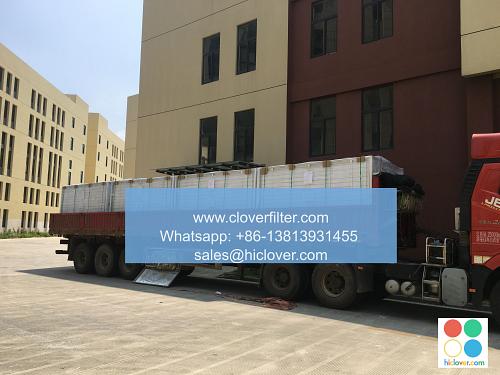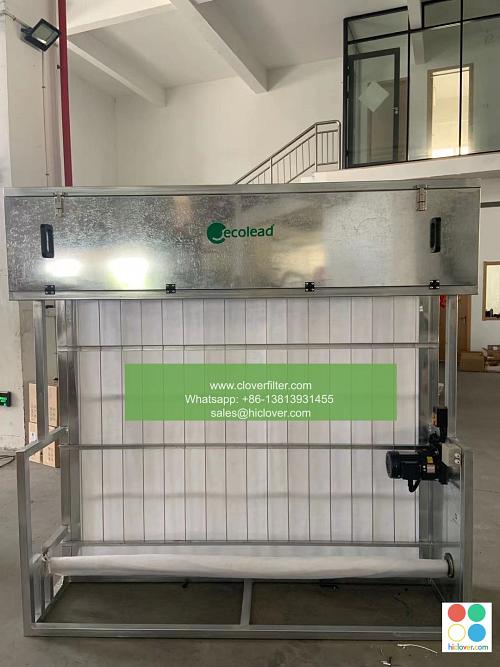Reducing Energy Consumption: Automatic Roll Air Filters in Vancouver Electronics Plant

In the heart of Vancouver, a pioneering electronics plant has embarked on an innovative journey to reduce its energy consumption, embracing sustainability and environmental stewardship. At the core of this initiative lies the integration of automatic roll air filters, a cutting-edge technology designed to enhance the plant’s air filtration system while minimizing energy expenditure. This forward-thinking approach not only contributes to a significant decrease in the plant’s carbon footprint but also sets a precedent for industrial facilities seeking to balance operational efficiency with environmental responsibility.
The decision to implement automatic roll air filters was the culmination of a comprehensive analysis aimed at identifying areas of energy inefficiency within the plant. Traditional air filtration systems, while effective in maintaining air quality, often come with a substantial energy cost due to the resistance created by the filter medium. This resistance, or pressure drop, necessitates higher fan speeds to achieve the required airflow, thereby increasing energy consumption. In contrast, automatic roll air filters offer a novel solution by continuously unrolling a new, clean filter media, thereby maintaining a consistent, low pressure drop and reducing the energy required for airflow.
The operational mechanics of these filters are as ingenious as they are straightforward. Essentially, the system consists of a roll of filter media that progressively unwinds to replace the segment of the filter that has become saturated with particulates. This process is automated and can be programmed to occur at intervals that optimize filter efficiency and longevity. The result is a consistent and high level of air quality, devoid of the periodic spikes in particle concentration that can occur with static filters when they reach the end of their service life.
From an economic perspective, the adoption of automatic roll air filters by the Vancouver electronics plant is predicted to yield significant savings over time. By reducing the fan energy associated with overcoming filter resistance, the plant can anticipate a tangible decrease in its electricity bills. Furthermore, the automated nature of the filter replacement process minimizes maintenance personnel time, previously allocated to the manual replacement of traditional filters. This dual benefit of reduced energy and labor costs can have a profound impact on the plant’s bottom line, enhancing its competitiveness in the global electronics market.
Moreover, the environmental implications of this technological shift are equally compelling. Lower energy consumption directly translates to reduced greenhouse gas emissions, given that a substantial portion of Vancouver’s electricity is generated from fossil fuels. In an era where corporate social responsibility and sustainability are under increasing scrutiny, the Vancouver electronics plant is proactively addressing these concerns, positioning itself as a leader in environmentally conscious industrial practices.
The integration of automatic roll air filters also underscores the plant’s commitment to the health and safety of its workforce. A well-maintained indoor air quality is crucial for preventing respiratory issues and other health problems associated with poor air quality. By ensuring a consistent supply of clean air, the plant is safeguarding the well-being of its employees, which can lead to improved productivity and job satisfaction.
In conclusion, the implementation of automatic roll air filters in the Vancouver electronics plant represents a seminal moment in the pursuit of energy efficiency and sustainability. This innovative technology, with its potential for significant energy savings and enhancement of indoor air quality, serves as a model for industrial facilities worldwide. As the world grapples with the challenges of climate change and environmental degradation, the adoption of such forward-thinking solutions will be crucial in mitigating our collective impact on the planet.
FAQs
- What are automatic roll air filters? Automatic roll air filters are an innovative type of air filtration system that continuously unrolls a new, clean filter media to replace the saturated segment, thereby maintaining a consistent, low pressure drop and reducing energy consumption.
- How do automatic roll air filters reduce energy consumption? By maintaining a consistent, low pressure drop, these filters reduce the energy required for airflow, as fans do not need to work as hard to achieve the required airflow.
- What are the environmental benefits of using automatic roll air filters? The primary environmental benefit is the reduction in greenhouse gas emissions resulting from lower energy consumption. Additionally, these filters contribute to better indoor air quality, which is crucial for the health and safety of workforce and occupants.
- Can automatic roll air filters be used in residential settings? While primarily designed for industrial and commercial applications, there are versions of automatic roll air filters suitable for residential use, particularly in large homes or homes with specific air quality concerns.
- How often do automatic roll air filters need to be replaced? The replacement frequency of the filter roll depends on several factors, including the air quality, usage rate, and the specific design of the automatic roll air filter system. Generally, these systems are designed to provide several months of service before the roll needs to be replaced.


